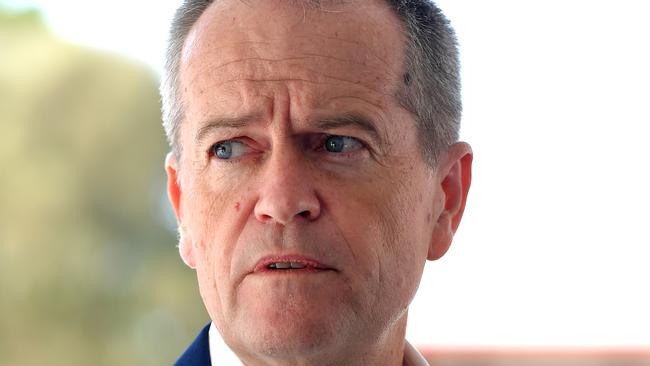Pensioners have nothing to fear with our tax plan: Shorten
Bill Shorten has signalled he will exempt pensioners from franking credits tax crackdown.

Bill Shorten has defended the estimated $59 billion revenue gain from his plan to scrap refundable tax credits on shares as questions grow over the modelling behind his tax crackdown and the government warns the plan will smash low-income earners and retirees.
The Opposition Leader, who yesterday pledged to pour more money into hospitals on the back of tax policies that will deliver Labor a $210bn war chest over the decade, gave a further signal he would exempt pensioners from his shake-up to Australia’s dividend imputation system.
“Pensioners will always be better off under a Labor government,” he said.
“We’re always looking for ways to make sure the least well-off and our older Australians get the best deal possible, and so we’ll have more to say about that in coming weeks.”
Malcolm Turnbull ramped up his attack against the Labor policy in a meeting with retirees on the NSW Central Coast, accusing Mr Shorten of “wanting to rob them” and eroding the living conditions of more than 230,000 pensioners.
The Prime Minister met a couple in their 80s whom he said stood to lose $3500 under the Labor policy. He said they had “managed their affairs frugally” and “saved over many years” to be financially independent.
“Bill Shorten is going to take that $3500 from them. It is tax that was paid by the company. Why should they not get it back? They are on a very low income,” Mr Turnbull said.
“He wants to take that away from them. Do you know what they said they would have to do? Cancel their private health insurance.”
Mr Turnbull did not say what the couple’s “very low income” was, or whether they had access to other assets or wealth.
Labor has accused the government of running a scare campaign against its policy by using “taxable income” as a benchmark to gauge the impact of the policy on low-income earners, arguing that this excludes incomes drawn from the tax-free retirement phase of superannuation accounts.
It has cited Grattan Institute research showing that a self-funded retiree couple with a $3.2 million superannuation balance — in addition to the family home and $200,000 shares outside super — could draw $130,000 a year in superannuation income, a combined taxable income of just $15,000 and pay no tax.
Mr Shorten came under pressure yesterday from the self-managed super fund sector over his repeated claims that some retirees were receiving up to $2.5m a year in cash refunds from the franking credits on shares.
The Self Managed Super Fund Association said that only a “handful” of funds would be receiving such large refunds, suggesting they would need to hold Australian equities of more than $100m.
Mr Shorten did not repeat the $2.5m figure, but said the government needed to explain how multi-millionaires could receive “tens of thousands of dollars, in some cases hundreds of thousands of dollars” in refunds while paying no income tax.
“How is it fair that seven million Australians on less than $87,000 a year have to pay income tax on the money they pay, but don’t get a tax refund when they pay no income tax,” he said.



To join the conversation, please log in. Don't have an account? Register
Join the conversation, you are commenting as Logout